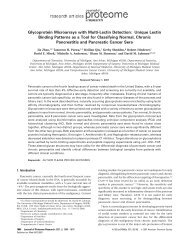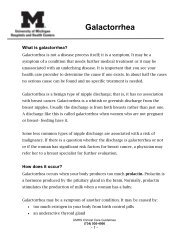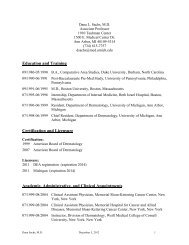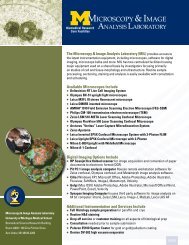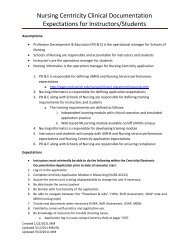uRoloGIC onColoGy - University of Michigan Health System
uRoloGIC onColoGy - University of Michigan Health System
uRoloGIC onColoGy - University of Michigan Health System
You also want an ePaper? Increase the reach of your titles
YUMPU automatically turns print PDFs into web optimized ePapers that Google loves.
ecent Developments in Kidney cancer treatment<br />
Bruce Redman, DO<br />
Pr<strong>of</strong>essor <strong>of</strong> Internal Medicine<br />
in the past five years, the fDA has approved<br />
six new agents for the treatment <strong>of</strong> metastatic<br />
kidney cancer. though the common target<br />
<strong>of</strong> these agents is angiogenesis, they can be<br />
grouped into three distinct classes based on<br />
their mechanisms <strong>of</strong> action.<br />
1. tyrosine kinase inhibition (tKi):<br />
represented by sunitinib, pazopanib,<br />
and sorafenib<br />
2. monoclonal antibody: represented<br />
by bevacizumab<br />
3. mammalian target <strong>of</strong> rapamycin<br />
(mtor) inhibition: represented by<br />
everolimus and temsirolimus<br />
the fDA approved all <strong>of</strong> these agents<br />
because they demonstrated clinical benefits<br />
in randomized trials. specifically, these compounds<br />
delayed metastatic disease progression;<br />
temsirolimus was the only agent, however,<br />
to show an overall survival advantage<br />
(albeit compared to the inactive interferon<br />
alfa). yet none <strong>of</strong> these agents are curative<br />
for metastatic clear cell carcinoma <strong>of</strong> the kidney,<br />
the only curative therapy for metastatic<br />
kidney cancer remains high-dose interleukin-2,<br />
and it only works in highly selected<br />
patients. Patients with metastatic clear cell<br />
carcinoma should be referred to a cancer<br />
center that has experience in, and expertise<br />
at, utilizing high-dose il-2 to discuss this<br />
potentially curative treatment option. for a<br />
more detailed discussion <strong>of</strong> the agents and<br />
how they fit in the treatment paradigm <strong>of</strong><br />
advanced kidney cancer, visit the national<br />
comprehensive cancer network treatment<br />
Guidelines webpage (www.nccn.org).<br />
As in the case <strong>of</strong> all clinical research, advances<br />
lead to additional questions. the following<br />
represent several <strong>of</strong> the more prominent<br />
research questions that have arisen in regard<br />
to the care <strong>of</strong> patients with kidney cancer.<br />
1. What role does cytoreductive<br />
nephrectomy play in the treatment<br />
<strong>of</strong> stage iV kidney cancer in the<br />
current era <strong>of</strong> targeted therapies?<br />
2. What are the mechanisms <strong>of</strong> resistance<br />
to targeted therapies?<br />
a. in primary failure (no<br />
response to initial therapy)<br />
b. in acquired resistance (initial<br />
response followed by disease<br />
progression)<br />
3. What is the role, if any, for the<br />
adjuvant treatment <strong>of</strong> high-risk<br />
patients after definitive surgery?<br />
4. When and how do we evaluate<br />
novel investigational therapies in<br />
the treatment <strong>of</strong> stage iV kidney<br />
cancer?<br />
Cytoreductive Nephrectomy<br />
there is currently no clinical trial data defining<br />
what role cytoreductive nephrectomy, in<br />
conjunction with the use <strong>of</strong> targeted therapies,<br />
plays in the outcome <strong>of</strong> patients with kidney<br />
cancer. Previous clinical trial results supported<br />
the use <strong>of</strong> cytoreductive nephrectomy plus<br />
interferon in selected patients with metastatic<br />
kidney cancer, but these results are difficult to<br />
translate to other targeted agents. interferon is<br />
now considered an inactive therapy for kidney<br />
cancer. the current front line tyrosine kinase<br />
inhibitors (tKis) have much greater clinical<br />
activity than interferon and thus may abrogate<br />
any benefit from cytoreductive nephrectomy.<br />
the question <strong>of</strong> whether cytoreductive<br />
nephrectomy, followed by the use <strong>of</strong> a tKi, is<br />
most effective is being addressed in ongoing<br />
national and international trials.<br />
Mechanisms <strong>of</strong> Resistance<br />
At the present time, we have no definitive<br />
answer to the question: What are the mechanisms<br />
<strong>of</strong> resistance to targeted therapies? We<br />
are, however, testing multiple hypotheses in<br />
our active clinical research.<br />
Adjuvant Treatment<br />
there is currently no validated adjuvant<br />
therapy for the treatment <strong>of</strong> high-risk resected<br />
kidney cancer. However, at U-m, we are<br />
participating in a national cooperative group<br />
trial, led by the southwest oncology Group,<br />
<strong>of</strong> a randomized double blind placebo controlled<br />
trial <strong>of</strong> everolimus as adjuvant therapy.<br />
Investigational Therapy<br />
there are no curative treatment options for<br />
patients who have not responded to il-2<br />
or who are not candidates for il-2. While<br />
current targeted therapies can meaningfully<br />
improve progression free survival, resistance<br />
ultimately develops in all patients. At U-m,<br />
we are performing clinical trials to evaluate<br />
new novel therapies for patients with metastatic<br />
kidney cancer; these are either part <strong>of</strong><br />
our ongoing Phase ii trial <strong>of</strong> anti-PD-1 immunomodulating<br />
trial or they are part <strong>of</strong> our<br />
Phase i program.<br />
3






